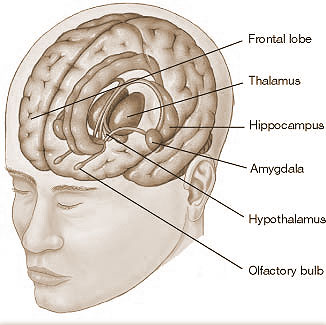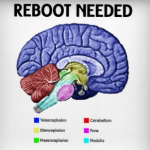Most people say anger is an uncontrollable reaction to external events that “tickle” our sensitivities. Scientists say anger is a sense of perceived threat that triggers a so called flight or fight response, causing you to feel threatened or defensive, and consequently – angry. Some research shows these reactions are exacerbated by head injuries or other trauma. But is this unsavory feeling so hard to control? Why at times we feel like we have totally lost it?
You see, anger is not merely an emotion experienced in our minds but in the body as well. So, in order to control anger, and be able to effectively apply the anger management techniques you must first understand the amazing complexity of your body and especially the brain.
The brain, like any complex system, has parts. Each part is responsible for something different. At the same time all parts depend on and interact with each other. For example, the cerebral cortex, which is the outermost layer of the brain, is responsible for rational thought, whereas the limbic system is responsible for emotional reasoning. The limbic system is located lower in the brain than the cerebral cortex. In the limbic system is a warehouse of emotional memories and responses called the amygdala. Now this may seem a bit technical at first but trust me, it will be worth your time to learn this. It’s truly fascinating stuff.
So, the all mighty amygdala has a critical role to play in the processing and sorting of emotions, including anger. It sits in the middle of the brain and is roughly the size and shape of an almond. That is, in fact, how it got its name. This is the “Command central” that controls which stimuli will be processed in the emotional and logical parts of the brain. To make matters worse, there are two of them! One on the left and one on the right.
Interestingly enough, when they are stimulated electronically, animals respond with aggression. If stressed continuously, it becomes “over-active” causing dramatic increases in levels of one’s agitation. However, there is more to the amygdala than simply anger. When removed, animals ignore stimuli that would have caused fear or even sexual responses. Not good, is it? Especially about the latter part…
When an overriding stimulus is encountered, one that causes anger, the amygdala goes into overdrive. The prefrontal cortex, which is concerned with consequences, tries to kick in, but the brain is essentially hijacked. It releases epinephrine and norepinephrine, stress hormones which stay in the body for quite a while afterward. Basically, the body gets ready for a fight or flight situation. “Run! This thing is going to eat you!” You want to hear the worst part? As long as the chemicals are in your bloodstream, your body will stay in this state of alertness for quite a while, perhaps ruining your entire day.To make matters worse, this stress response further causes a depletion of our “happy” chemical produced by our brain – seratonin. According to the latest study at Britain’s Cambridge University reserchers found out that when serotonin levels are low, it may be more difficult for the brain to control emotional responses to anger:
“Low brain serotonin made communications between specific brain regions of the emotional limbic system of the brain — specifically, the amygdala — and the frontal lobes weaker compared to when serotonin levels are normal.”
Another fascinating research at Harvard Medical School and Massachusetts General Hospital revealed that “anger increases blood flow to a reasoning part of their brains, an area over the left eye just behind the forehead, technically called the orbitofrontal cortex. This flow inhibits thoughts of rage. At the same time, blood flow increased activity in the amygdala, (that already mentioned almond-shaped knot of tissue deep in the brain that deals with emotion and vigilance.) “All of us get angry from time to time,” comments the researcher Darin Dougherty, an assistant professor who led the research. “At such times, feelings of wrath in the primitive parts of our brains seem to be balanced by inhibitions of our will to act on those feelings.”
Interestingly, the same research also showed that with people who are dealing with both depression and rage, things go in a “slightly” different way. “A decrease in blood flow to these areas of the brain reduces both their ability to control impulsive acts and their feelings about the consequences of those acts, say punching someone in the mouth. There is both a lack of emotion and a lack of control. A double hit that adds up to inappropriate, even violent rage.”
So in simple terms, what does all this mean? It means that your brain/mind processes external events and controls what the body does in response. Therefore, what you feel is to some extent controlled by your brain, specifically the limbic system, the amygdala and the chemical cocktail produced inside your head. That is why most anger management techniques like “think happy thoughts” you’ll find online are as effective as gramma’s cough syrup against a bad case of diarrhea. They go about anger management the wrong way because they address the things you should only think or imagine. Realistically though, how can you really control anger with simple thoughts when your brain has a program of its own!? You see, the key to managing anger is to understand your body and your mind’s relationship to it. Stay tuned for some techniques that will address this issue and help you deal with anger in a much more effective way.



 “I Feel Pretty” – Pattern Interrupt Technique in Action?
“I Feel Pretty” – Pattern Interrupt Technique in Action? Misophonia – the Antisocial Hate of Sound and Movement Disorder Explained
Misophonia – the Antisocial Hate of Sound and Movement Disorder Explained What You Need to Know About Your HPA Axis in Order to Manage Irritability More Effectively
What You Need to Know About Your HPA Axis in Order to Manage Irritability More Effectively
I would like to know the techniques to control the anger
Hi Annette, please browse around some more articles here, there are quite a few techniques that are mentioned. If you have any questions about specifics, feel free to email me, will be happy to chat more.